I have to say I doubt if any modern steel barrel would fail with reasonabl powder charges. I have made 'signal cannon' out of gas pipe and caps touched off by a fuse. Safety pesky wouldn't be a fear for me with loyalist arms.
You are using an out of date browser. It may not display this or other websites correctly.
You should upgrade or use an alternative browser.
You should upgrade or use an alternative browser.
Loyalist Arms Fusil
- Thread starter Treestalker
- Start date

Help Support Muzzleloading Forum:
This site may earn a commission from merchant affiliate
links, including eBay, Amazon, and others.
- Joined
- Jan 3, 2013
- Messages
- 20,091
- Reaction score
- 1,025
Proof :idunno: .....proof  .....proof :hmm: ......
.....proof :hmm: ......  I've got it....
I've got it....
Idiot proof!.... :haha:
 I've got it....
I've got it.... Idiot proof!.... :haha:
You cant make things idiot proof, Idiots are too ingenious :haha:
- Joined
- Jan 3, 2013
- Messages
- 20,091
- Reaction score
- 1,025
Very true!....
Did you ever pick one up ?
Thanks for the feedback guys, I like the Loyalist fusil because it fits and the price is good, even if I have to rework it. Also locally available new in hand. BUT, I can wait a while; you never know what might show up :grin: George.
Treestalker
Treestalker
- Joined
- Mar 24, 2014
- Messages
- 4,051
- Reaction score
- 3,748
- Location
- Third Pond from the Great God Helios
Hello Nchunter, no, I went a different route.
If the United states doesn't have proof standards, then what are "blue pill loads"? Personally having been a welder in a machine shop, I question the reliability of wrought iron barrels with a forge welded seam, yet many people will pay large amounts of money for an authentic hand forged barrel. My 2 cents.
Blue Pill Cartridges came about to double check barrels, with a very high pressure load. Not for muzzle loading. The idea was to take several out of a set of delivered firearms, and fire the cartridges, and to see if the guns bulged or blew at their breech. People who use the term for a muzzleloader are misusing it, since the testing cartridges were painted blue to identify them as testing ammo, not service ammo. There can't be a "blue pill cartridge" in a rifle or gun that doesn't use cartridges....
Nobody said the United States doesn't have proof standards. Simply, there is no laboratory that officially tests to CIP standards, known as a "proof house" in North America. Winchester Repeating Arms, for example has their own standards, which they call "Winproof". SAAMI and CIP both have pressure standards for specific modern cartridges, and should any American manufacturer of firearms build a firearm and chamber it for a specific cartridge, and it was later shown that those same firearms could not reliably fire that cartridge without damage to the firearm and or shooter, and that the firearms failed with a standard cartridge that met SAAMI spec... or CIP specs, the manufacturer would be at fault. Thus the United States firearm manufacturers are bound by SAAMI specs, even without their barrels being subjected to official proof-house testing.
LD
Nobody said the United States doesn't have proof standards. Simply, there is no laboratory that officially tests to CIP standards, known as a "proof house" in North America. Winchester Repeating Arms, for example has their own standards, which they call "Winproof". SAAMI and CIP both have pressure standards for specific modern cartridges, and should any American manufacturer of firearms build a firearm and chamber it for a specific cartridge, and it was later shown that those same firearms could not reliably fire that cartridge without damage to the firearm and or shooter, and that the firearms failed with a standard cartridge that met SAAMI spec... or CIP specs, the manufacturer would be at fault. Thus the United States firearm manufacturers are bound by SAAMI specs, even without their barrels being subjected to official proof-house testing.
LD
jbwilliams3
45 Cal.
- Joined
- Dec 23, 2006
- Messages
- 689
- Reaction score
- 159
Personally having been a welder in a machine shop, I question the reliability of wrought iron barrels with a forge welded seam, yet many people will pay large amounts of money for an authentic hand forged barrel. My 2 cents.
It would be interesting to see how the hand-made barrels from Williamsburg would stand up to actual proofing. They do test those barrels and everyone that I know of who has made a forged, wrought iron barrel I would trust UNDER NORMAL CIRCUMSTANCES. I know Gary Brumfield wrote about how he and Wallace Gusler and some others often loaded with two patched balls in their barrels. As with modern circumstances of barrel bursting, I would hazard that the majority of period accounts of burst barrels were due to barrel obstructions.
fourbore
40 Cal
This discussion implies the barrels from Loyalist are hand forged or iron or welded. Without any information provided I might as well assume they were using round/hollow seemless steel stock. It as a good a guess as any and seems much more likely than anything fabricated from scratch. I am also going to hope, using Loyalist as an intermediate those guys are keeping tabs on the product. I recently saw a website based out of India selling replicas. I passed right over that becasue it was too much of an unknown. As for product liability, seems that if guns stated failing, Loyalist would own a piece of that liability. All wishful thinking from a maybe buyer.
This discussion came back from the dead at an oportune time. I am corona bound and while shopping for a kit, I found myself perusing the Loyalist website. And where to begin? They have matchlock, early english mid 1600's guns and the French 1768. I also a little curios about pricing. If the Can$ posted is right the exchange rate is very favorable for US$. Call it $550 for a lot of this stuff. Pedersoli can be 1500 and while strong enough not always authentic or reliable. I would honestly consider buying two or three from Loyalist than suffer Pedersoli customer service again.
This discussion came back from the dead at an oportune time. I am corona bound and while shopping for a kit, I found myself perusing the Loyalist website. And where to begin? They have matchlock, early english mid 1600's guns and the French 1768. I also a little curios about pricing. If the Can$ posted is right the exchange rate is very favorable for US$. Call it $550 for a lot of this stuff. Pedersoli can be 1500 and while strong enough not always authentic or reliable. I would honestly consider buying two or three from Loyalist than suffer Pedersoli customer service again.
- Joined
- Feb 28, 2019
- Messages
- 3,634
- Reaction score
- 4,624
It is said that the' Cobblers kid is poorest shod .'And my India made Bess I used for Re enactments in the US was got up from three different wrecks . I made it a fire risk & the barrel stood UK proof I upgraded the side plate made it composite fore pipe corrected the tang apron IE put one. Very fond of it but I sold it on . While I've never bought from Loyalist Arms I have advised them and find they are most respectable firm .. Rudyard
I have a 1728 Brown Bess from Loyalist Arms and while I have not have a chance to shoot it live yeat it seems that the workmanship is fine. I understand that they go over all guns they receive before they are shipped out. They did send me the information on how to do a proof test on it and I will do it when I have the time and a space where I can do it legally.
As for product liability, seems that if guns stated failing, Loyalist would own a piece of that liability. All wishful thinking from a maybe buyer.
Folks on other forums when similar topic(s) were raised thought that American barrel makers, because they would be liable for a barrel failure caused by improper materials being used, would therefore be so liable that the lack of proofing here in the United States by a CIP proofing house, is a moot point. "American made barrels must be good to avoid being sued." There's an assumption there that doesn't meet muster (imho)
Once upon a time, there was an American barrel company that did very well. Now …, at this point... the story goes two different ways.
One is that there was an accident, they got sued, and their liability insurance paid only so much, so the company went bankrupt. The other version, is that the original company had some tough economic times, and went under...but... another person bought the company name and began making barrels under that name. It was this reborn version of the barrel company, that went under when sued due to an accident, in the second version of the story.
Likely a mistake in loading blew up the barrel, so it was operator error, but the barrel maker had liability insurance and these "deep pockets" drew the attention of the injured party's attorneys. The company folded and that was that.
Except insurance companies got wind of it, and liability insurance for the small businesses that black powder rifle barrel makers often are, couldn't afford insurance when the costs skyrocketed. Which meant owner/operators would personally be "standing downrange when the line went hot" if they got sued. These folks couldn't risk that much just to run a business. So they were all done..., or were they...???
Incorporation was the solution, IF it was in a state with the proper laws. You see in some states..., if a manufacturer leases the land, the facilities, and the machines used to make their product, then the company itself only owns ONLY the small amount of raw materials on the premises. The company has very few assets to be attacked in a lawsuit, and unless one can show that the owner and/or other company officers deliberately knew they were selling a defective product, the plaintiff cannot go after their personal property nor cash. (That's why Johnson & Johnson is in such trouble with talcum powder...the court case showed they knew some of it had asbestos
So what one is likely to see, if one sued an American company making gun barrels, is the company would immediately declare bankruptcy and fold. No court case to set a precedent. The plaintiff might get, say 50 barrels in various stages of completion, from raw bar stock to finished product. The owner/operator would then incorporate under a similar company name, and would then lease the facility and the machines within, for the new corporation. The old employees let go when the old company folded would become the new employees of the new barrel company, and voila, …, back in business as if nothing had happened.
So John Q. Doe Barrels would die, and a week later you'd find John Q. Doe Barrel Works was now in business on the same spot. If they got sued again, the process would repeat, but the new company might be named, JQD Barrels..... & etc. & etc.
What keeps the barrel makers from selling dangerous stuff is reputation. In the above scenario if Mr. Doe became personally known for making barrels that were actually failing, then anyplace he went to make barrels under any name would then be tainted and people simply wouldn't buy them.
LD
I have one of their Virginia smooth rifle kits that I built. Top notch all the way around.I ran across their site the other day... Had never heard of them before that. What's the word on their quality and accuracy.

- Joined
- Nov 26, 2005
- Messages
- 5,247
- Reaction score
- 11,028
Hi,
Having worked over quite a few India-made guns, I believe the barrel safety issue is a red herring. It is what most seem to focus on but the real issues concerning these guns is poor historical accuracy and often very poor locks. With respect to locks, I've encountered poor or no heat treating, screws misaligned, ridiculously heavy springs, and locks so badly made they are not safe. All of those locks came from guns sold by vendors who claim they "work them over". Finally, I get why folks buy them because they are much less expensive than a properly made copy of an original. However, I take issue with anyone, including the sellers, who try to claim they accurately represent the styling and quality of the original guns they supposedly represent. They are at best "movie prop" versions. Below are photos of a properly made and accurate copy of a British light infantry fusil juxtaposed with photos of the India-made version sold by a top vendor.

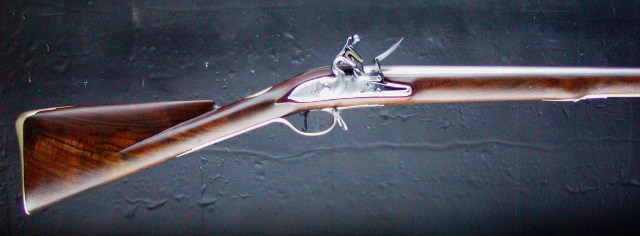
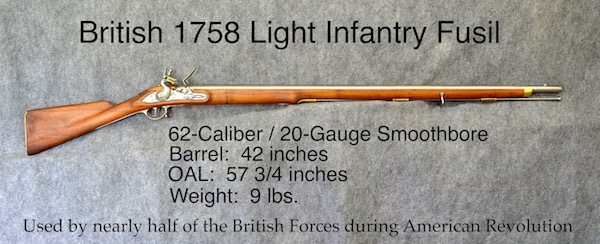

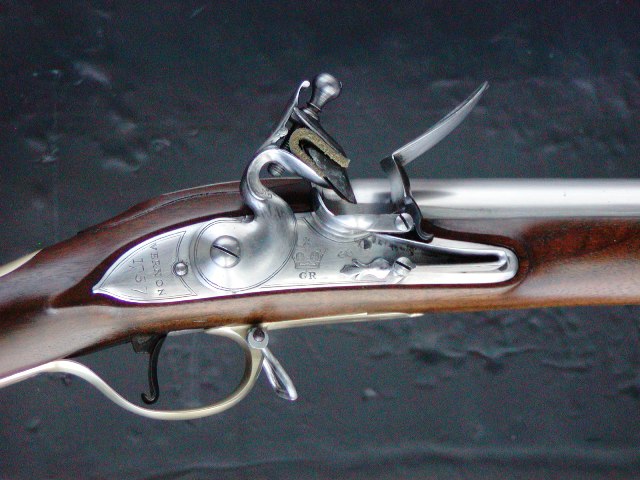
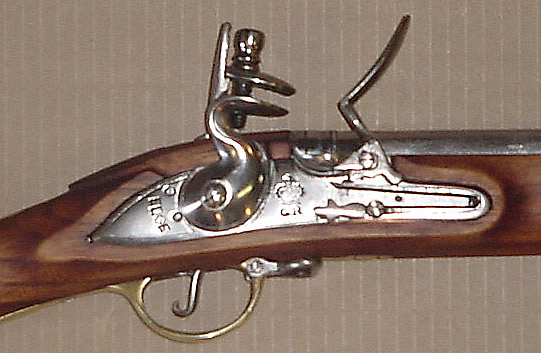
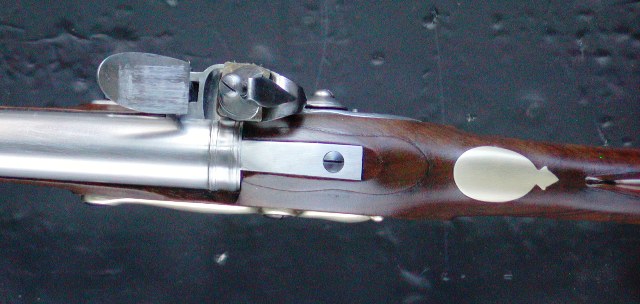
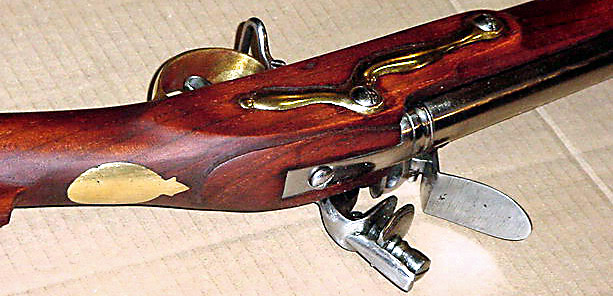
dave
Having worked over quite a few India-made guns, I believe the barrel safety issue is a red herring. It is what most seem to focus on but the real issues concerning these guns is poor historical accuracy and often very poor locks. With respect to locks, I've encountered poor or no heat treating, screws misaligned, ridiculously heavy springs, and locks so badly made they are not safe. All of those locks came from guns sold by vendors who claim they "work them over". Finally, I get why folks buy them because they are much less expensive than a properly made copy of an original. However, I take issue with anyone, including the sellers, who try to claim they accurately represent the styling and quality of the original guns they supposedly represent. They are at best "movie prop" versions. Below are photos of a properly made and accurate copy of a British light infantry fusil juxtaposed with photos of the India-made version sold by a top vendor.








dave
Last edited:
Treestalker
Treestalker
- Joined
- Mar 24, 2014
- Messages
- 4,051
- Reaction score
- 3,748
- Location
- Third Pond from the Great God Helios
Thanks Dave, that's quite an eye opener! I was wanting one for an inexpensive smoothbore ball and shot capable gun, but decided to build my own. I have an 1861 Springfield musket barrel that has been opened to .60 caliber smooth that I will probably make a late trade gun or half stock shotgun out of. The barrel has the military patent breech and is 40 inches long.
I remember some rumors that Douglas barrels were not safe because they contained lead. They probably did contain lead as it is added to some steels to make them machine more easily. I used to complain to my wife and daughter "that the general public is a horses a$$" , and they used to get mad at me. Now that they have to go to the grocery store during this "pandemic" and interact with the general public they seem to begrudgingly agree with me. I am sure that all of the people who condemned Douglas barrels had PHD's in metallurgy!
- Joined
- Nov 26, 2005
- Messages
- 5,247
- Reaction score
- 11,028
Hi,
Yeah, they were probably 12L14 steel, which is a leaded mild steel, Getz, Rice, FCI, Colerain all use it because it machines well. However, it is not a certified gun barrel steel and no modern American made muzzleloader barrels are officially proofed. Yet thousands of muzzleloading guns have those barrels and their safety record is pretty darn good. The same is true of the India-made guns. In my opinion, there are plenty of issues with the India-made guns but the barrels are not one of them.
dave
Yeah, they were probably 12L14 steel, which is a leaded mild steel, Getz, Rice, FCI, Colerain all use it because it machines well. However, it is not a certified gun barrel steel and no modern American made muzzleloader barrels are officially proofed. Yet thousands of muzzleloading guns have those barrels and their safety record is pretty darn good. The same is true of the India-made guns. In my opinion, there are plenty of issues with the India-made guns but the barrels are not one of them.
dave
Treestalker
Treestalker
- Joined
- Mar 24, 2014
- Messages
- 4,051
- Reaction score
- 3,748
- Location
- Third Pond from the Great God Helios
My brother Fred Martin used a Douglas barrel on his homegrown Kentucky rifle and it not only never blew up, but he out shot me with my Sharon barreled SMR. --I GUESS HE KNEW WHAT HE WAS DOING--I asked him if Dad taught him how to shoot, like he did me, and he said, ' No, my drill instructor Gunnery Sergeant Keller did in boot camp..' He said Sgt. Keller was a black man 'The color of a Damson plum' who did not tolerate prejudice in the ranks.I remember some rumors that Douglas barrels were not safe because they contained lead. They probably did contain lead as it is added to some steels to make them machine more easily. I used to complain to my wife and daughter "that the general public is a horses a$$" , and they used to get mad at me. Now that they have to go to the grocery store during this "pandemic" and interact with the general public they seem to begrudgingly agree with me. I am sure that all of the people who condemned Douglas barrels had PHD's in metallurgy!
I have weighed in on this topic before and since it seems to keep coming up, this will be my last post on this subject...I have owned and shot and worked on the Brown Bess from Loyalist Arms. THAT musket (I can't speak to ALL only the one I had), was just fine (for the price). I shot fine after I lightened the main spring some. I never had any issues and I shot it with pretty heavy loads. The stuff about them being unsafe is BS. The steel used for the barrels in India is NOT quite as good as what we see in the States BUT, it's still better than anything that was available back in the time period they are representing. The only real issue I had with mine was the wood they all use for the stocks - it's Teak and is heavy and doesn't hold an edge when filing or sanding etc. The guns from Loyalist Arms represent a real value for those wanting to "try out" a flintlock style musket and not prepared to drop some serious money for a better made and higher quality firearm but they are NOT unsafe guns to enjoy shooting, they are just not near the quality in fit and finish as the more expensive makes. No, I don't work for Loyalist Arms but I don't work for Pedersoli either!
Similar threads
- Replies
- 4
- Views
- 389
- Replies
- 2
- Views
- 499
- Replies
- 14
- Views
- 826



